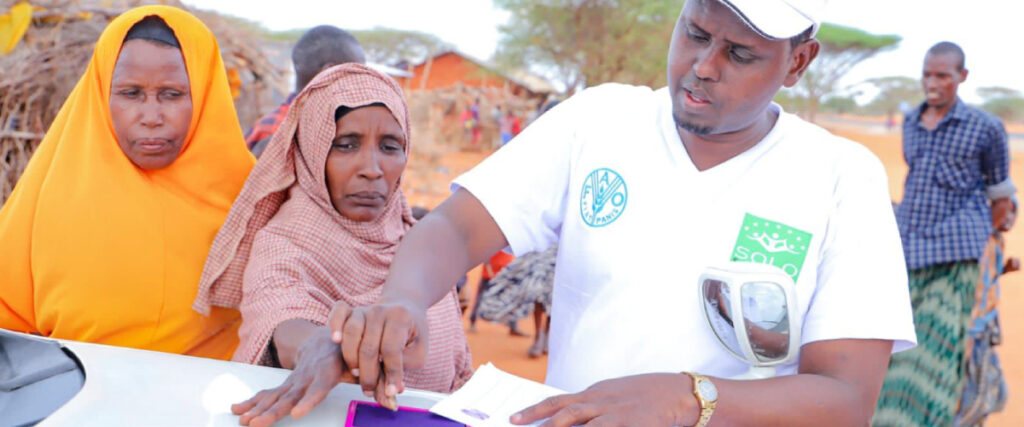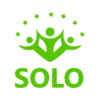Cash transfer and Market Development
When disaster strikes money is often the first thing people need to buy food or pay for temporary accommodation to get out of harm’s way. We shore up affected areas where markets are functioning but people can’t afford to buy food. When vulnerable households are provided with purchasing power, they make choices that improve their well-being and are less likely to sacrifice one basic need to meet the other.
“Well planned project such as HOIFA well-managed economic activity support matched to these needs and priorities constituted to critical components of long-term solutions to solve problems associated with drought in the region.”

SOLO M&E team has developed KOBO Toolbox system with questioners to register the beneficiaries details, this system has enhanced SOLO staff to analyze the beneficiaries details and make correction appropriately. SOLO has engaged Hormuud and sign a contract with as the service provider to distribute 100$ (Total 26000$) Unconditional Cash intervention to 260 IDPs in Luglow and Hormuud has provided WAAFI system for SOLO verified and corrected the details of the beneficiaries as per registered in EVC.
The developing of KOBO Toolbox account to register the beneficiary details and also track the GPS of the intervention helped us ensure quality data and to moniter progress
The intervention improved the living standard of IDPs by providing room for the beneficiaries to exercise their rights of choice to purchase as per their needs and this enhanced the market demand to increase due to money circulation enabling the economic to grow.
Beneficiary feedback mechanism included Hormuud hotline numbernd was meant to capture all kinds of beneficiary’s feedback including complains or grievances .Another important channel was the community committees established by SOLO to report incidents to the feedback focal person. The beneficiaries were made aware and sensitized to share their complaints with the committee members which they later shared with SOLO staff. The beneficiaries were also encouraged to use the hotline number for the purpose of privacy and safeguarding their security. SOLO ensured, 20 complaints from the beneficiaries were responded to in a timely manner.
All inquiries and complaints raised were addressed and a response delivered to the concerned. The cases are stored in a database that is built on data protection policies basis to secure the confidentiality of the complainants and their identities.SOLO provided safe space for the beneficiaries such as women and people with disabilities to participate throughout the response process by ensuring safety during mobilization and safe hours. The project also remained conscious of risks of transmission of covid-19 and took precautionary measures such as avoiding crowding and large meetings. This participation of the target people throughout the project cycle, including women, people with disabilities and the elderly was considered critical for the success of our mission. We organized a committee comprising of representatives of the community featured women, elders, youth, minorities, host community and people living with disability. The committee participated in community mobilization, registration and verification of beneficiaries, collection of feedback, resolution of disputes relating to the project and confirmation that each households received its cash entitlement. Local administration was also engaged throughout the project in ensuring security of the project. The administration kept the project team updated on the security status and advised on the appropriate measures to take to ensure personal safety of staff. Community and other counterparts are the backbone of SOLO implementation strategy as we cannot implement without their support. The roles of the community representatives was
- Identification and verification of beneficiaries
- Maintain order during registration of beneficiaries.
- Action as source of information and intermediate.
- Ensure security remains conducive for project implementation.
With regard to other actors, SOLO will work closely with existing coordination structures including; Regional inter-cluster coordination, inter-cluster forums and drought taskforce as well as local authorities and community leaders in identifying and prioritizing the resources entrusted to them based on demand for services and existing gaps. SOLO regularly attends all clusters related meetings both at Regional and National/State level for information sharing and identifying the existing gaps.
SOLO involving and implementing other project in Area has played a major role for the community to engage and coordinate with the staff, this has enhance the community to have trust with SOLO by providing timely service delivery.
MARKET DEVELOPMENT
SOLO carried out Market Assessment Study to Identify Barriers to Business Start-Ups and Scale-Ups within Livestock and Apiculture value chains for Women, Youth and PLWD in Garissa County and later took a step and carried out a Project: Strengthening the livestock market systems in Garissa county through value chain approach to meet the people’s needs.
The market assessment was undertaken to identify barriers to business start-ups and scale-ups for youth, women and PLWD in target areas of Garissa County within the following broad value chain focus, while employing the lens of market systems development.
- Commercial fodder production along the Tana Riverbanks targeting the youth.
- Feedlot rearing of livestock for sale to abattoirs for women and youth
- Small ruminant production and marketing for women and people with disabilities
- Bee keeping targeting women and people living with disabilities (PLWD]
As per the findings of the assessment, marketing efforts are largely individualised, disjointed, and lacking in comprehensive understanding of how to profitably grow the market. However, the assessment identified the existence of women and youth groups who work together to produce and sell fodder but fail to reach their optimum as their market is hinged on existence of an institutional buyer inform of county government or NGO, which unfortunately are not regular. SOLO however propped up for this individuals and strengthened and motivated them.
Somali lifeline organization facilitated 6 days to identify the beneficiaries. The selection process was guided by the following key parameters;
- Market actors or groups that agree to take on business practices that are value-added and customer/supplier-oriented: The selection process included gender considerations as applicable, while asking questions as to what role women play in the value chain.
- The selection process included a co-creation process between the project and the groups: The process of selecting which groups to work with included qualifying the ones who agrees to take on key business strategies and practices that are in line with a value-added, customer/supplier-oriented business model. This market centred orientation provides the foundation upon which solid market relationship can be built and sustained.
- For compliance reasons, SOLO separated this process from any resource decision: This was intentional to ensure that groups are not attracted by benefits but by their quest to grow and improve their enterprises. This was guided by the following principles;
- Commitment to a value added and customer-oriented growth strategy.
- Commitment to investing in a relational market strategy within the market place.
- Commitment to understanding different customer segments, including women, and how to best target those segments with strategies most appropriate to them.
- The selection process was structured to ease likely adaptation: SOLO looked at the level of exposure of the groups as well as the duration of existence. We also gathered information of other agricultural activities they are involved in, this was intended to gauge their level of adaptability to change and innovation.
We are organized a workshop where we presented our findings and diagnosed the challenges and mitigation measures in each value chain as detailed below;
Our team conducted virtual and physical verification of 2000 beneficiaries data for them to receive their cash transfer.
1000 gender disaggregated beneficiaries in each of the 2 target counties received both cash and range cubes.
SOLO seeks to reach certain target to reduce deprivation and improve the lives of children and families. We also held a project i.e business development support to youth and women in kismayo.
MARKET DEVELOPMENT
Through the project,
- 200 youth and women were trained in business idea generation and supported with grants ranging from USD800 to USD1,500 and mentored to grow their businesses.
- 900 households benefitted from cash for work and unconditional cash support to help drought affected communities to recover.
- Productive infrastructure Was rehabilitated to support pastrolists to build resilience.
- 828 workers rehabilitated water catchments and bunds through cash for work while another 112HHs received unconditional cash transfers.
- Helped business leaders to constantly seek to expand their businesses and improve top and bottom line performance.
- SOLO helped local community companies develop and implement growth strategies including start-up companies with little or no commercial capability.
- SOLO identifies the distinctive capability of the community enterprises and works on positioning them to reach new customers.
- Our team educated the community to discover and develop opportunities, evaluate financial issues and develop a market entry strategy.
- We trained men and women to do primary and secondary market research, gap analysis and we worked hand in hand with them to execute the agreed market development strategy ensuring them to realize maximum value from their investment.
- We also created competitive environment in the local markets by giving them the power to come up with a careful market development plan that starts with uncovering customer needs and ends with a well-though-out that is ready for execution using the right approach.
